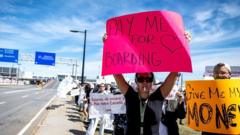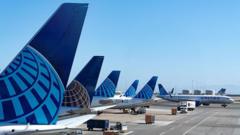The striking workers, primarily from operations in Missouri and Illinois, are integral in producing F-15 fighter jets and other military aircraft. The strike was initiated after these union members rejected Boeing's offer, which included a proposed average wage increase of 40%, citing concerns over pay, work schedules, and pension plans. Dan Gillian, VP of Boeing's Air Dominance unit, expressed disappointment over the rejection of what he described as a significant compensation offer.
This strike marks a critical moment for Boeing, which has been grappling with numerous challenges, such as previous safety issues and a lengthy strike last year by passenger plane workers. Leadership from the International Association of Machinists and Aerospace Workers (IAM) revealed that the walkout would focus on respect and dignity in the workplace, distinguishing it from previous negotiations characterized by empty promises.
Notably, this is the first strike within Boeing's defense sector since 1996, highlighting a shift in union dynamics, as IAM represents around 600,000 members across various industries. Despite the potential impacts of this strike, Boeing’s CEO Kelly Ortberg minimized concerns, suggesting that the strike's scale is significantly less impactful compared to last year's major labor disruption.
Boeing's recent history has been marred by crises, including two deadly crashes linked to its 737 Max model, which raised serious safety questions. Additionally, production fell to its lowest levels since the pandemic, with only 348 aircraft delivered in the last year. The question remains whether Boeing can recover from its ongoing crises while navigating this latest labor challenge.
This strike marks a critical moment for Boeing, which has been grappling with numerous challenges, such as previous safety issues and a lengthy strike last year by passenger plane workers. Leadership from the International Association of Machinists and Aerospace Workers (IAM) revealed that the walkout would focus on respect and dignity in the workplace, distinguishing it from previous negotiations characterized by empty promises.
Notably, this is the first strike within Boeing's defense sector since 1996, highlighting a shift in union dynamics, as IAM represents around 600,000 members across various industries. Despite the potential impacts of this strike, Boeing’s CEO Kelly Ortberg minimized concerns, suggesting that the strike's scale is significantly less impactful compared to last year's major labor disruption.
Boeing's recent history has been marred by crises, including two deadly crashes linked to its 737 Max model, which raised serious safety questions. Additionally, production fell to its lowest levels since the pandemic, with only 348 aircraft delivered in the last year. The question remains whether Boeing can recover from its ongoing crises while navigating this latest labor challenge.



















